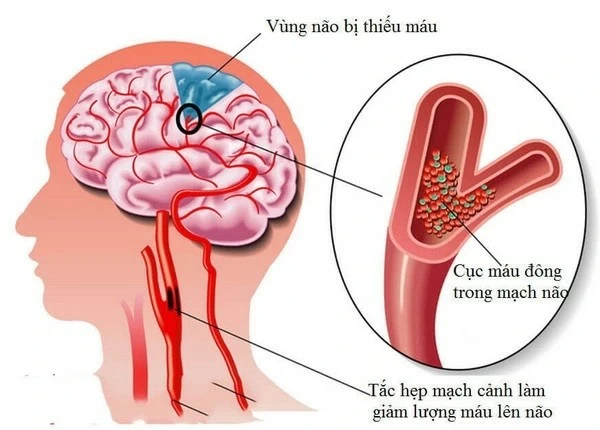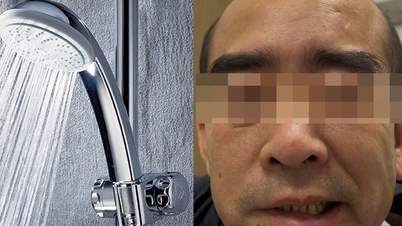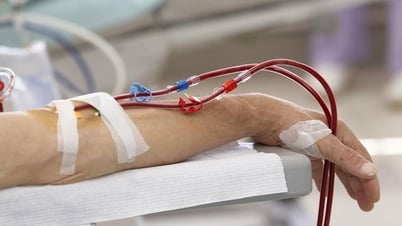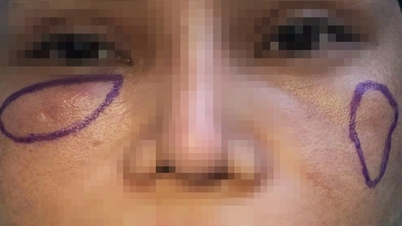Cerebral ischemia is a condition in which there is insufficient blood flow to the brain, causing brain cells to not receive enough oxygen and necessary nutrients. Cerebral ischemia is a warning sign that a stroke may occur in the future if not prevented.
 |
| Cerebral ischemia is a condition in which the blood supply to the brain is insufficient, causing brain cells to not receive enough oxygen and necessary nutrients. (Source: tamanhhospital.vn) |
Due to lack of energy, nerve cells' activities and functions are greatly affected.
What is called cerebral ischemia?
Cerebral ischemia is a warning sign of a possible future stroke if not prevented.
Each area of the brain is nourished by a separate blood vessel. If these blood vessels are narrowed or blocked, reducing blood flow to the part of the brain that the blood vessel controls will cause dysfunction in that area of the brain. Furthermore, each part of the brain controls a part of the body: movement, sensation, language, the 6 senses...
Therefore, when a brain area is damaged, symptoms will appear in the body that the brain area controls, such as: If the motor area of the brain is damaged, the patient will be paralyzed. If the language area is damaged, the patient will have slurred speech or will no longer be able to speak...
Depending on the level of anemia and the function of the brain cells that the blood vessels nourish, the body will experience different symptoms such as: weak limbs, crooked mouth, difficulty speaking, slurred speech, numbness on one side of the body, dizziness, vertigo, etc.
Causes and signs of cerebral ischemia
Cerebral ischemia usually starts with mild symptoms that are difficult to recognize and increase with the severity of the disease. Common symptoms include: headache, sleep disturbance, dizziness, nausea, sensory disturbances, fatigue, memory loss, etc. Mild weakness or hemiplegia, slurred speech or inability to speak, sudden blindness in one or both eyes, sudden loss of balance, dizziness, unsteadiness when walking or standing, etc.
Cerebral ischemia is more common in the elderly, people with cardiovascular disease, blood pressure, but currently, the rate of young people suffering from this condition is increasing.
The above symptoms only last about 1-10 minutes, rarely lasting more than 1 hour. When symptoms last more than 1 hour, the patient is considered to have a stroke, at which point the brain has been permanently damaged.
The causes of the disease are also very diverse, a person with cerebral anemia can have one or more combined causes:
- Atherosclerosis: is the cause of more than 80% of cases of cerebral ischemia.
- High blood pressure causes blood vessels to gradually dilate, causing damage, aneurysms, brain hemorrhages, and blood clots to form, obstructing blood circulation.
- Cardiovascular disease causes the function of pumping blood to the brain as well as other organs to decline.
- Spinal and cervical spine diseases: cause compression of blood vessels supplying the brain.
In addition, other factors that cause cerebral anemia include: Stress, tension, lack of exercise, unscientific diet, alcohol and tobacco abuse, etc.
Measures to reduce the harm and risk of cerebral ischemia
Although there is no radical treatment for cerebral anemia, if treated actively and with changes in lifestyle and nutrition, the disease can be completely controlled. In addition to using medication, patients need to pay attention to the following issues to prevent and control the disease better.
Healthy, scientific, nutritious diet
Nutrition is very important in nourishing and ensuring the function of the brain, heart and circulatory system. For patients with cerebral anemia, it is necessary to pay attention to supplementing nutrients such as:
- Iron: helps promote blood production, increases blood quality to nourish the brain as well as the whole body.
- Omega 3: Enhances heart activity and brain function, found in salmon, herring, cod, etc.
- Nitrate: found in spinach, lettuce,...
- Polyphenols: found in tea, beans, cocoa, nuts, etc.
Besides, it is necessary to limit unhealthy foods such as: animal fat, fast food, stimulants and alcoholic beverages, processed foods, food additives...
 |
| Image of cerebral ischemia. (Source: SKDS) |
Exercise and move daily, regularly
Exercise is the best way to improve health, muscle and cardiovascular flexibility, thereby helping blood circulation to the brain better. Therefore, both healthy people and sick people need to spend time exercising at least 30 minutes every day.
Exercises that are good for cardiovascular activity and pumping blood to the brain include: walking, dancing, yoga, stretching, cycling, etc.
Rest and reduce stress
Patients should spend more time relaxing their body, resting, avoiding stress and overwork. In particular, they need to ensure enough sleep time every day, 7-8 hours and go to bed early before 11 pm.
Use medication as prescribed
Use medications and functional foods that support blood flow to the brain in the correct dosage and duration as instructed by your doctor. To improve cerebral anemia, you need to persevere in treatment combined with lifestyle and nutritional changes.
Regular health check-up
Cerebral ischemia can potentially cause many dangerous complications that threaten the patient's health and life such as: sudden anemia, stroke, memory loss and brain function loss, etc. Therefore, patients need to have regular check-ups to check the severity of the disease as well as review and eliminate potential risks.
Source




![[Photo] Prime Minister Pham Minh Chinh chairs the regular Government meeting in April 2025](https://vphoto.vietnam.vn/thumb/1200x675/vietnam/resource/IMAGE/2025/5/6/48eb0c5318914cc49ff858e81c924e65)
![[Photo] Prime Minister Pham Minh Chinh chairs meeting to review preparations for trade negotiations with the United States](https://vphoto.vietnam.vn/thumb/1200x675/vietnam/resource/IMAGE/2025/5/6/1edc3a9bab5e48db95318758f019b99b)

![[Photo] Prime Minister Pham Minh Chinh receives Mr. Tomas Heidar, Chief Justice of the International Tribunal for the Law of the Sea (ITLOS)](https://vphoto.vietnam.vn/thumb/1200x675/vietnam/resource/IMAGE/2025/5/6/58ba7a6773444e17bd987187397e4a1b)


























































































Comment (0)